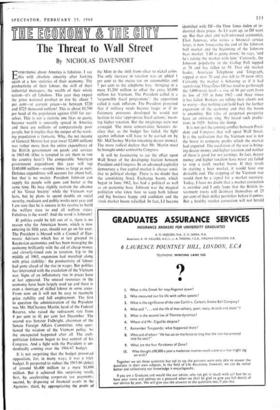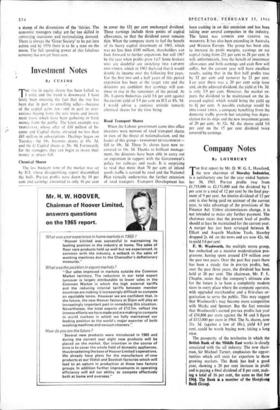identified with DJ—the Dow Jones index of in-
ECONOIN MIE
The Threat to Wall Street
By NICHOLAS DAVENPORT
EVERYTHING about America is fabulous. I say this with absolute sincerity after looking again at a few statistics of their economy. The productivity of their labour, the skill of their industrial managers, the wealth of their whole nation—it's all fabulous. This year they expect the gross national product to rise by about 7 per cent—at current prices—to between $720 and $725 thousand million! This is about $3,700 per head of the population against f545 for our- selves. This is not a statistic one likes to quote, because wealth is unevenly spread in America and there are millions of comparatively poor people, but it implies that the output of the work- ing population is fantastic. Why, the net income of General Motors last year (over $2,000 million) was rather more than the entire expenditure of the British government on goods and services in 1965-66. (One is tempted to ask them to run the country here!) The comparable American government expenditure this year will top $140,000 million—seventy times as large as ours. Defence expenditure will account for about half, but that is no matter. President Johnson can supply his people with guns and butter at the same time. He may slightly restrain the advance of his 'Great Society' while the Vietnam war lasts, but he plans to spend double on social security, medicare and public works next year and I am sure that he is sincere in his resolve to build the welfare state to end all welfare states. Fabulous is the word! And the word is Johnson!
If politics could be left out of it, there is no reason why the American boom, which is now entering its fifth year, should not go on for ever. The President is blessed with a Council of Eco- nomic Advisers which has at last grasped its Keynesian economics and has been managing the economy brilliantly with the aid of cheap money and cleverly-timed cuts in taxation. Up to the middle of 1965, expansion had marched along with price stability: the productivity of labour had gone ahead of the rise in wages. But politics has intervened with the escalation of the Vietnam war. Signs of an inflationary rise in prices have at last appeared. The unused resources in the economy have been largely used up and there is even a shortage of skilled labour in some areas. From now on it will not be easy to reconcile price stability and full employment. The first to question the administration of the President was Mr. McChesney Martin, head of the Federal Reserve, who raised the rediscount rate from 4 per cent to 4f per cent last December. The second was Senator Fulbright, chairman of the Senate Foreign Affairs Committee, who ques- tioned the wisdom of the Vietnam policy. So the unexpected happened after all. The arch- politician Johnson began to lose control of his Congress. And a fight with the President is un- doubtedly coming over the 1966-67 budget.
It is not surprising that the budget provoked opposition, for, in many ways, it was a trick budget. It purported to reduce the 1965-66"deficit of around $6,400 million to a mere $1,800 million. But it achieved this surprising result, first, by accelerating corporate tax payments; second, by disposing of financial assets in the Agencies; third, by appropriating the profit of
the Mint in the shift from silver to nickel coins. The only increase in taxation was an added 1 per cent to the excise tax on automobiles and 7 per cent to the telephone levy—bringing in a mere $1,200 million to offset the extra $5,000 million for Vietnam. The President called it a 'responsible fiscal programme': the opposition called it rank inflation. The President protested that if military needs became larger or if in- flationary pressures developed he would not hesitate to take 'appropriate fiscal actions,' mean- ing higher taxation. But the misgivings were not assuaged. The more conservative Senators de- clare that, as the budget has failed, the fight against inflation will have to be carried on by Mr. McChesney Martin (meaning dearer money). The more radical declare that Mr. Martin must be brought under control by Congress.
It will be fascinating to see the effect upon Wall Street of the developing friction between President and Congress. In an advanced capitalist democracy a free capital market is always sensi- tive to political change. There is no doubt that the astonishing Stock Exchange boom, which began in June 1962, has had a political as well as an economic base. Johnson was the magical politician who knew how to keep both labour and big business happy and confident and the stock market boom refuelled. In fact, LJ became dustrial share prices. As U went up, so DJ went up. But that alert and well-informed economist, Eliot Janeway, who writes a financial service letter, is now forecasting the end of the Johnson bull market and the beginning of the Johnson bear market. 'LBJ is going down,' he says, 'and he's taking the market with him.' Curiously, the Johnson popularity in the Gallup Poll topped at 78 and has fallen to 59. That old market leader, American Telephone and Telegraph, topped at near 70 and also fell to 59 (now 601). Certainly the market is behaving as if it had seen its top. Three times DJ has tried to go through the 1,000-mark level—a rise of 86 per cent from its low of 535 in June 1962—and three times it has failed. Brokers arc telling their clients not to worry—that nothing can hold back the further expansion of the economy and that the boom is unending. But tales of perpetual prosperity have an ominous ring. We heard such predic- tions in 1929—before the slump.
It is not just the coming conflict between Presi- dent and Congress that will upset Wall Street. It is the realisation that the Vietnam war is not the boost to company profits which the market had expected. The escalation of the war is bring- ing dearer money and higher taxation and neither of these is good for net earnings. In fact, dearer money and higher taxation have never yet failed to stop a stock market boom. If they result in starting a bear market, it would have one desirable end. The stopping of the Vietnam war would then be a signal for a market recovery. Today, I have no doubt that a market correction is overdue and I only hope that the British in- vestment trusts will disinvest themselves of 25 per cent of their dollar portfolios before it comes. But a healthy market correction will not herald
a slump of the dimensions of the 'thirties. The economic managers today are far too skilled in correcting recessions and restimulating demand. There is always the 'Great Society' to be put into action and by 1970 there is to be a man on the moon. The full spending power of this fabulous economy has not yet been seen.



































 Previous page
Previous page